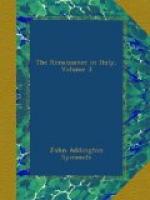Now were fit time for me to
scrape a treasure,
Seeing that work
and gain are gone; while he
Who wears the
robe, is my Medusa still.
Perchance in heaven poverty
is a pleasure:
But of that better
life what hope have we,
When the blessed
banner leads to nought but ill?
A third sonnet of this period is intended to be half burlesque, and, therefore, is composed a coda, as the Italians describe the lengthened form of the conclusion. It was written while Michael Angelo was painting the roof of the Sistine, and was sent to his friend Giovanni da Pistoja. The effect of this work, as Vasari tells us, on his eyesight was so injurious, that, for some time after its completion, he could only read by placing the book or manuscript above his head and looking up.[420]
I’ HO GIA FATTO UN GOZZO
I’ve grown a goitre
by dwelling in this den—
As cats from stagnant
streams in Lombardy,
Or in what other
land they hap to be—
Which drives the belly close
beneath the chin:
My beard turns up to heaven;
my nape falls in,
Fixed on my spine:
my breast-bone visibly
Grows like a harp:
a rich embroidery
Bedews my face from brush-drops
thick and thin.
My loins into my paunch like
levers grind;
My buttock like
a crupper bears my weight;
My feet unguided
wander to and fro;
In front my skin grows loose
and long; behind,
By bending it
becomes more taut and strait;
Backward I strain
me like a Syrian bow:
Whence false and
quaint, I know,
Must be the fruit
of squinting brain and eye;
For ill can aim
the gun that bends awry.
Come
then, Giovanni, try
To succour my
dead pictures and my fame;
Since foul I fare
and painting is my shame.
The majority of the sonnets are devoted to love and beauty, conceived in the spirit of exalted Platonism. They are supposed to have been written in the latter period of his life, when he was about sixty years of age; and though we do not know for certain to whom they were in every case addressed, they may be used in confirmation of what I have said about his admiration for Vittoria Colonna and Tommaso Cavalieri.[421] The following, with its somewhat obscure adaptation of a Platonic theory of creation to his own art, was probably composed soon after Vittoria Colonna’s death.[422]
SE ’L MIO ROZZO MARTELLO
When my rude hammer to the
stubborn stone
Gives human shape,
now that, now this, at will,
Following his
hand who wields and guides it still,
It moves upon another’s
feet alone.
But He who dwells in heaven
all things doth fill
With beauty by
pure motions of his own;
And since tools
fashion tools which else were none,
His life makes all that lives
with living skill.




